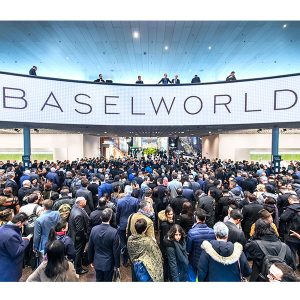
Basel could use some mazel.
Last week, the Swatch Group pulled out of Baselworld, complaining the century-old watch fair had failed to innovate and was no longer worth the money. (Keep in mind, Swatch’s Basel budget was a reported $50 million.) The world’s largest watchmaker’s decision to leave, coupled with CEO Nick Hayek’s blasts at parent company MCH, was such a seismic event that within days, the head of MCH resigned.
This week, JCK surveyed some leading watch executives, retailers, and insiders—most of whom wished to remain anonymous—to get their opinion on the fair’s future.
U.S. retailers that regularly attend Baselworld tell JCK that (for now) they still plan to go, since that’s almost a requirement when doing business with certain brands.
Still, they think Swatch’s defection could be potentially pivotal.
“Other brands will be thinking about their future plans,” one retailer says. “The future of the fair will be determined by Rolex, Patek Philippe, and Swatch.”
Adds another: “The big Swiss watch brands are evolving toward limited distribution. If you only have 150 doors, do you really need to do a show?”
Another said he will continue to attend if Rolex and Patek still exhibit. But if they stop, all bets are off.
While the fair is clearly in crisis, most hope the current tumult will spark much-needed changes.
“Swatch’s departure may have been a political move to force out current management and to force additional changes to the fair,” says one exhibitor, who admits he’s a skeptic on the future of watch shows in general. This exhibitor believes that, if changes do occur, Swatch will return.
Overwhelmingly, respondents say the fair’s biggest problem is it’s just too expensive. And they meant not just the show, but the whole experience of staying nearby. They particularly hated how area hotels enact seven- and 10-day minimum stays during fair week, forcing attendees to pay for rooms they don’t use.
“Basel has become the world’s most unhospitable city,” says Steven Kaiser, president of New York City–based Kaiser Time. “The prices feel like you’re not just being gouged, but hit up by the Mob. A cup of coffee is six bucks. A three-star hotel is $600 a night. It’s not even fun eating out anymore. Not everything has to be a five-star meal.”
The spiraling costs have made some attendees stay outside the city, limiting the time they spend at the fair, he adds.
Kaiser thinks MCH should clamp down on local price gouging, and if the hotels and restaurants don’t comply, it should move the show somewhere else. “There’s plenty of cities.”
Attendees also expressed unhappiness with the fair itself, saying it needs to be more than a showcase for big watchmakers.
“Basel is great for major brands, but what’s missing is the smaller and medium-size companies,” says Kaiser. “It used to be people went to Basel and they’d find things they couldn’t see anywhere else. Retailers would come and feel like they accomplished a lot.”
Michael Pollak, CEO of Hyde Park Jewelers, agrees that Basel was once a “great fair for looking at jewelry from all over the world. Now the jewelry hall has shrunk by 70 percent.”
Nor does the fair have many extras, like seminars or events. “From a retail perspective, the added value is zero,” he says.
Another U.S. retailer, who has been attending for decades, suggests “special sections like there used to be, where we can see the best technology, gemstones, packing, and visual merchandising.” He also recommends networking events that spotlight the next generation of industry leaders. “As it is, it’s becoming a week where all of the old timers complain that Basel isn’t what it used to be.”
“How about an app,” he adds, “included with my exorbitant entry fee, which would interface with transportation providers, restaurants, etc.?”
Maximilian Büsser, founder of watch brand MB&F, says that management needs to listen more to the industry.
“The fair organizers seemed more interested in their revenue than in that of their exhibitors,” he says. “For a fair to be a success, it must be first of all a success for the exhibitors, which automatically [boosts] the retailer and press experience. Baselworld was, for example, a terrible experience for collectors. It is time that changed.”
Still, Büsser sounded upbeat about the fair’s future, feeling that Swatch leaving will be “extremely positive” for up-and-coming manufacturers like him.
“Whether you have 500 or 600 exhibitors, the number of retailers and press are going to remain around the same,” he says. “So as an exhibitor, you’d prefer to have fewer brands, right? You have more chance of spending quality time with the people you see.
“This year, with fewer exhibitors, journalists were telling me they’re less stressed, and retailers were saying the same thing—that it’s become much nicer than it used to be…. I want to say to my friends from the brands who are currently exhibiting in the hotels around Baselworld, maybe it’s time to join us.”
(Image courtesy of MCH Group)
- Subscribe to the JCK News Daily
- Subscribe to the JCK Special Report
- Follow JCK on Instagram: @jckmagazine
- Follow JCK on X: @jckmagazine
- Follow JCK on Facebook: @jckmagazine